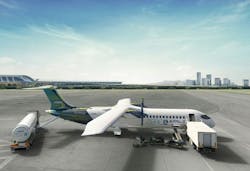Airbus-led European liquid hydrogen project underway for aviation and ground operations
BRUSSELS - A new project led by Airbus in Toulouse, France aims to demonstrate small-scale liquid hydrogen aircraft ground operations at three European airports. The initiative is supported by academic partners, airport operators, and leading hydrogen-industry companies.
The GOLIAT (Ground Operations of LIquid hydrogen AircrafT) project will receive €10.8 million in funding from the EU’s Horizon Europe Framework Program via the European Climate, Infrastructure and Environment Executive Agency (CINEA). Over four years, the project will develop and test high-flow liquid hydrogen (LH2) handling and refueling technologies for airport operations.
The consortium comprises 10 partners from eight countries: Airbus (France, Germany, UK), Chart Industries (Czech Republic, Italy), TU Delft (Netherlands), Leibniz University Hannover (Germany), Royal Schiphol Group (Netherlands), Rotterdam The Hague Airport (Netherlands), Vinci Airports (France, Portugal), Stuttgart Airport (Germany), H2FLY (Germany), and Budapest Airport (Hungary).
Related: GE, Safran, and Airbus ink hydrogen aircraft demonstrator deal
The project aims to support the aviation industry’s shift to LH2 transportation and energy storage solutions by:
- Developing and demonstrating LH2 refueling technologies for future large commercial aircraft;
- Demonstrating small-scale LH2 aircraft ground operations at airports;
- Developing the standardization and certification framework for future LH2 operations;
- Assessing the sizing and economics of hydrogen value chains for airports.
As a clean and efficient fuel, LH2 is seen as a promising solution for reducing greenhouse gas emissions and fossil fuel dependence in airport operations. LH2’s high energy density enables long-range travel for aircraft, but challenges remain in understanding the operational, regulatory, economic, and safety impacts, as well as the capacity and performance of relevant technologies.
